Hasbro’s Family Game Night has been a bit of marketing genius really. Bring the family together by playing all your favourite (Hasbro) games, spawning a very successful video game series and now a fairly neat TV show on a fledgling family channel which drops the Hasbro branding but still has the game names plastered everywhere. Brilliant.
The Family Game Night logo. The titles feature a montage of the games featured in the day’s episode. The show is often compared to The Price is Right, in that it has a pool of games to pick from, of which Guess Who? and five others are played out on the show itself.
Here’s our host Todd Newton. Previously known for hosting Hollywood Showdown, more usually recognised for hosting Whammy: The All New Press Your Luck, hosting on the Home Shopping Network and hosting live versions of The Price is Right. I like Newton a lot, keeps the energy levels up, plays up situations in a rather knowing way.
It’s time to introduce the families through video and photo montage. The youngest member of the team is credited as the captain of sorts, and gets to do the voiceover. The families appear to be of the nuclear mum, dad and two kids varieties.
And this is what it’s all about, the Monopoly Crazy Cash cards. Winning a game entitles the family to pick one. There are 21 in total…
And tonight one of them is worth $12,500. The top prize changes from episode to episode. What it is important to remember is that there are no real losers in this show – whatever is won you keep but the family who has amassed the most money will also win a bonus prize, tonight it’s a trip to the Carribbean.
The warm-up game is Guess Who? Winning this game means you get to pick the first cash card (for this game only the other family also then gets to pick a card, so everyone walks away with something). Winning a game also gives you the choice of going first or second in the following game.
Guess Who? plays rather differently to its board game counterpart, here clues are given to a famous person. You have to buzz in and guess who it is.
It’s Zac Efron, by the way.
Each of the cash cards has a different Monopoly symbol on it. There’s the pig, there. Cash cards are kept on the table next to the red and yellow stands until the end of the show where their values are revealed.
The first game proper of the evening is Boggle. Or rather, Bounce ‘n’ Boogie Boggle.
It’s played similarly to normal Boggle (although in this case with the 5×5 grid, Super Boggle). The families have two minutes to score as many points as they can. Letters in words must be joined. The longer the word the greater the score, and if they come up with the secret word pointed out (that’s ‘waffle’. by the way) then the family score a bonus prize.
On their go, the player must call out the word, run to the first letter than bounce from letter to letter to make it. Nominating a word that doesn’t exist, a word that’s already been called or nominating a word and discovering you can’t make it mean scoring no points and losing your turn. There’s an obvious advantage to going first here, in that if you go first you may well get one more go over your opponent. In all taking-it-in-turns games the family member playing rotates each go.
Although in this instance team Yellow stuffed up one of the words and let the red team through on the buzzer. Not only do Johnny’s family get to pick a cash card, but as they won a game they also win a prize, a candy floss (sorry, "cotton candy") cart in this instance. There’s a prize for each game.
Game two this evening is the Bop It! Boptagon. Simple game but quite good fun – all family members stand at one of eight Bop it! stations with some sort of action to perform which Bop It maestros will be familiar with – "twist it!" "pull it!" etc. When the voice instructs you to do something, you have to do it quickly – do it too slow, or do your thing when you weren’t asked to and you are elimited. Additionally there are two more instructions to complicate matters – "rotate it!" in which case you move to the station on your left i.e. clockwise and "reverse it!" which means move to the station on your right i.e. anti-clockwise. Dithering or taking a step in the wrong direction are both crimes punished by elimination.
The game continues until members of just one family remain who win the game. The call outs get quite tricky towards the end with lots of repetition then breaking of repetition.
Game three is Connect 4 Basketball. The idea is to connect four balls of your own colour by chucking them into the grid.
But first the balls from the example have to be released which is quite an amusing touch.
The players nominate the slot they’re aiming to get into but as you might be able to see from the set-up, anything other than an accurate throw is liable to have the ball bouncing all over the shop. The gutrtering usually stops the ball from bouncing back, although if it does then the shooter can rethrow.
And team red have won!
Game four is Guesstures Freefall, a rather imaginative reimagining of the game.
Here, one member of the family must try and guess words being acted out by members of the family hoisted above the Guesstures pit. Each correct answer is worth 10 points. Most points after both teams have had two minutes wins. However, if the guesser chooses to pass or the clock runs out…
The player is quickly dropped behind the board (mimicking the home game’s clapperboard swallowing the answer cards) with much yelping and the next player in line continues. Then they’re bought back up. Repeat until time runs out, then they all get dropped.
According to the Wikipedia entry, the rules have changed for this game since this episode was broadcast.
The final game is Cranium. Cranium is a game of four disciplines of which one will be played when used. Tonight it’s Data Head – contestants will be shown pictures of landmarks upside down. The kids go first, all they have to do is name them for ten points each. After five, the adults have their go but instead they must name the country the landmark can be found for 20 points. Best combined score wins the game.
All games played, it’s time to put the Crazy Cash Cards into the Crazy Cash Cards machine. As we know, one of the cards is worth $12,500. Apparently at least one of the cards is a four-figure sum, the rest range from $100 to $995 in five dollar increments. So even if you don’t win a game, your free pick on Guess Who? might have won you a lot of money and a holiday anyway.
The card goes in…
The money counts up…
And a random ton of Monopoly money spews forth. Pleasing.
I can’t lie, it feels like the show is going to give away a lot more cash than it actually suggests from the top of the show (that’s the total from 4 and 3 cards respectively), although I suppose what’s actually won is fine for cable.
The big money was hidden on the plane card as it turns out, and as everyone starts chucking lots of Monopoly money around it’s time for Newton and announcer Burton Richardson to sign off.

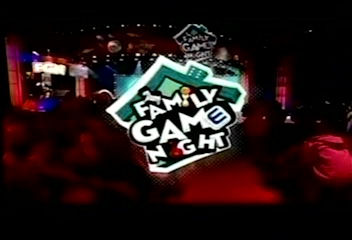
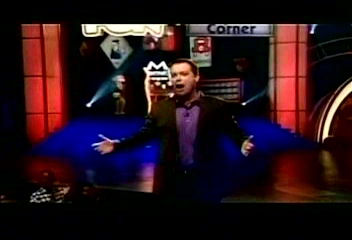
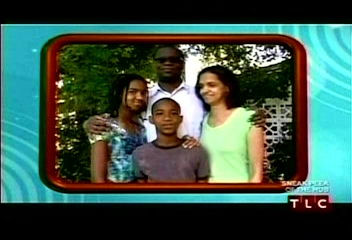
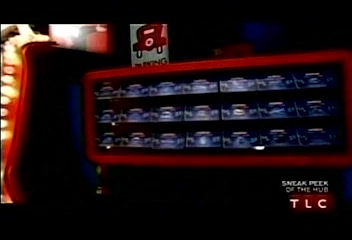
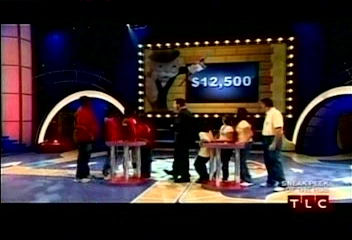
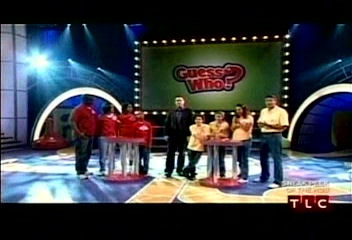
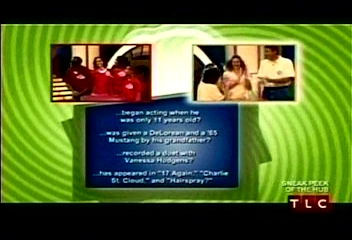
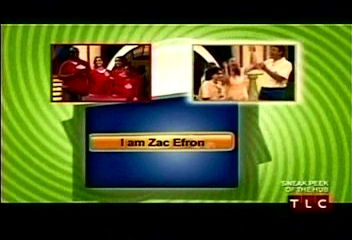
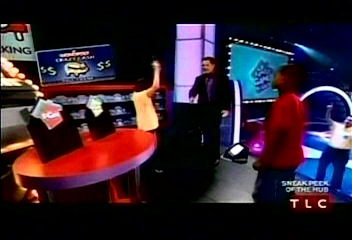
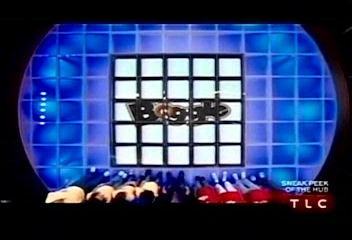
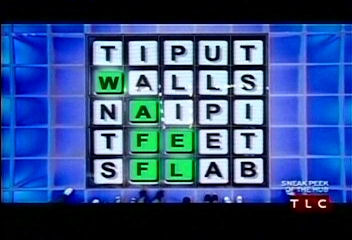
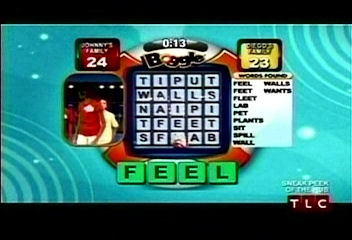
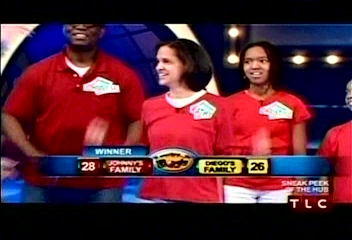
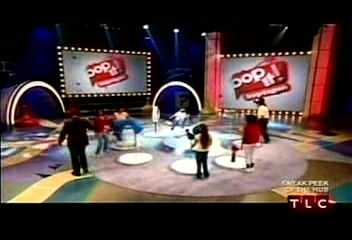
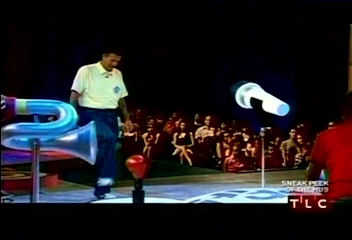
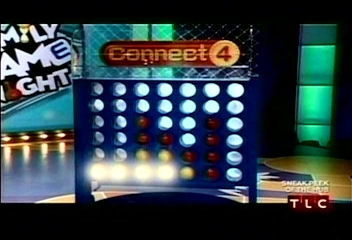
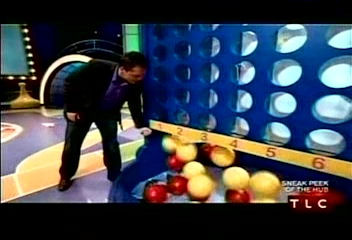
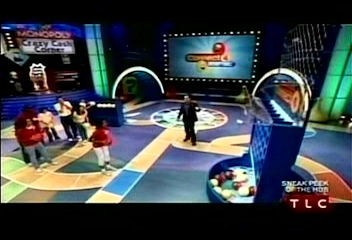
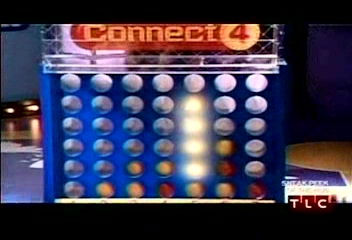
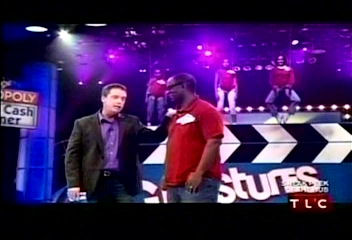
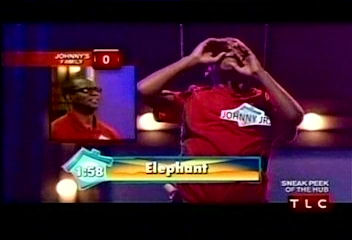
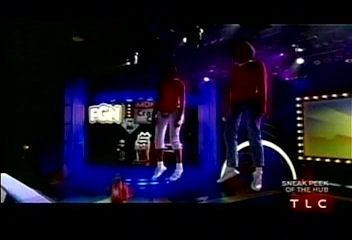
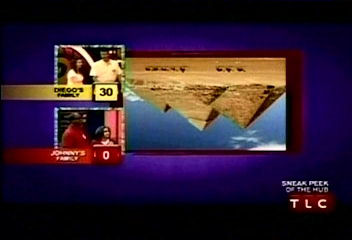
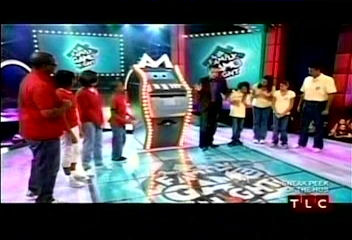
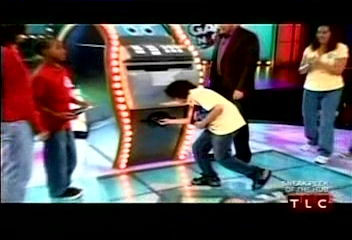
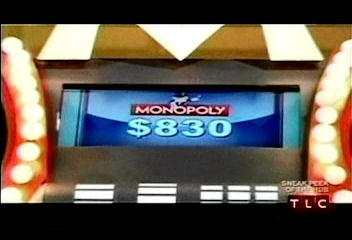
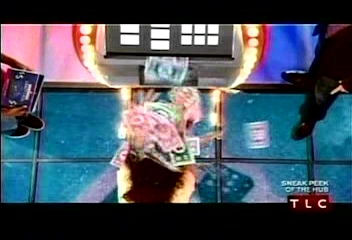
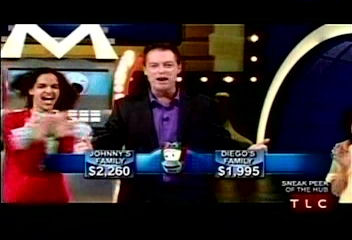
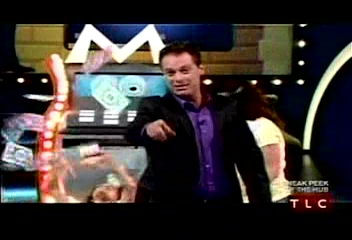
Pingback: New Feature | Bother's Bar
For game shows, this is probably one of the few areas (other than increased funding) where allowing paid product placement on UK shows will actually help a format.
Among the other games played on “Family Game Night” so far have been:
–Scrabble Flash, where you rearrange 5 letter tiles (which spell at least one 5-letter word) into words, and earn a point for each letter in the words you form. Game is 25 points.
–Sorry! Sliders, which is like shuffleboard played with giant pawns. You have to slide a pawn downstage into a target area while trying to bump your opponents’ pawns out. After both families have slid two pawns, scores are tallied and whoever has more points wins the round, and two rounds wins the game.
–Twister Lights Out. This variation on Twister is played on a 10×10 grid of colored dots. After a few spins, the dots will start to disappear going clockwise. If you see that the dot your hand or foot is on is about to disappear, move it to a dot of another color, or else you’re out of the game. The last player left wins the round, and two rounds wins the game.
–Yahtzee Bowling, where you roll a giant bowling ball down an alley so it will hit equally sizable hexagonal pins, each side with a different number of dots. Your goal is to get a better hand than your opponents. The order of poker dice hands is a little different in that a full house beats a small straight (like 1-2-3-4), but a large straight (1-2-3-4-5 or 2-3-4-5-6) beats a full house. You get up to 3 rolls per frame, and the best 2 frames out of 3 wins the game.
The full house beating the small straight is sorta odd, considering in the actual game of Yahtzee, full houses score 25 while small straights score 30.
Scrabble Flash is interesting, because that was released as Boggle Flash in game form in stores over here. Good old Scrabble and its international licensing.
I am predicting that we’ll see both Yahtzee Bowling and Connect 4 Basketball in the stores by Christmas.